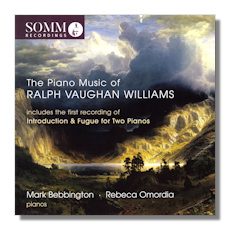
The Internet's Premier Classical Music Source
Related Links
-
Vaughan Williams Reviews
- Latest Reviews
- More Reviews
-
By Composer
-
Collections
DVD & Blu-ray
Books
Concert Reviews
Articles/Interviews
Software
Audio
Search Amazon
Recommended Links
Site News
 CD Review
CD Review
Ralph Vaughan Williams

The Piano Music
- The Lake in the Mountains
- Introduction and Fugue
- Ach bleib' bei uns, Herr Jesu Christ, BWV 649 (arr. for Piano)
- Fantasia on a Theme by Thomas Tallis (arr. M. Jacobson for 2 Pianos) *
- Hymn Tune Prelude on Song 13 by Orlando Gibbons
- Fantasia on Greensleeves (arr. for Piano Duet) *
- A Little Piano Book
- Valse Lente
- Nocturne
- Canon
- Two-Part Invention in F *
- Two-Part Invention in E flat *
- Two-Part Invention in G *
- Suite of Six Short Pieces
- Prelude
- Slow dance
- Quick dance
- Slow air
- Rondo
- Pezzo ostinato
Mark Bebbington, piano
* Rebecca Omordia, piano
SOMMCD 0164
The music of Vaughan Williams was so rich in color and texture that the piano was an unlikely instrument for him. Indeed, he once stated that he was not particularly drawn to it. Only a tiny percentage of his over 200 (published) works is for the piano. Nevertheless British pianist Mark Bebbington (joined by Rebecca Omordia in some works) and the independent British label SOMM (which was founded in 1995) are very likely to make you think again again about the composer's ability to write beautiful, idiomatic and worthwhile music for piano. Even if you had not reached such a conclusion listening to the composer's almost 40 songs written with piano accompaniment. In well over an hour we get at least one work which could be classed as outstanding and fully deserving of a place in the repertoire. Several of the others performed with panache and sensitivity by Bebbington and Omordia are not far behind.
The Lake in the Mountains [tr.1] opens the CD and is that superb work. It's not a long piece at just over five and a half minutes. Impressionistic, it suggests water, water's movement and the (inevitable) tranquility of a body of water when surrounded by hills in such a way that reflections of immobile land match the movement of liquid. One will instantly be made to think of Debussy. But Vaughan Williams has tones of mystery and open questions in the many key changes which are characteristic of the piece. It also alerts us to the thoughtful yet neither maudlin nor over indulgent playing style of Bebbington. While he wishes to draw us into the atmospheric, almost plangent scene which we think the composer must have had in mind as he composed The Lake in the Mountains, it's the strength of the music's apparent – and paradoxical – simplicity that counts; not any "geographical" evocation.
The same is true for the longest work on the CD, the Introduction and Fugue [tr.2], which is the first recording of the work. It too suggests melancholy with Vaughan Williams characteristic modal writing and expressive phrasing as if leading us through landscape and time simultaneously.
The arrangement by Maurice Jacobson (1896-1976) of the Tallis Fantasia [tr.4] dates from just after the Second World War and in some ways is a wrench when one bears in mind the full orchestral piece's almost deterministic harmonic resolution of that much lusher piece. Like the Fantasia on Greensleeves (which was also arranged for piano duet), it at the same time in some ways emphasizes one important aspect of the music on this CD, namely: how far can the essence of (Vaughan Williams') orchestral music be distilled to such reduced sonorities. Liszt's piano transcriptions come to mind.
You're likely to be struck in the other pieces by the variety of Vaughan Williams's writing. His inspirations are Bach, Beethoven, Gibbons (as in the Hymn Tune Prelude [tr.5]), as well – of course – as his own music and its own sources – often from folk traditions, even if obliquely. Other pieces – the Little Piano Book [tr.s 7-12] and Suite of Six Short Pieces [tr.s 13-18] have a slightly more perfunctory feel. But Bebbington easily brings out every ounce of expression, feeling and reflection without seeming to apply an ounce of pressure. He really does seem destined to become a remarkable pianist. Similarly Omordia and he effortlessly get the tenor just right by evoking regret with restraint in the duet arrangement of the timeless "Greensleeves" Fantasia [tr.6]. Their pianism suavely draws the listener in, creating something that's new without being novel.
The CD was recorded at the Adrian Boult Hall, Birmingham Conservatoire over two days in March 2016. There is perhaps more resonance than you would expect for a (solo and duet) piano recital. The instruments have a sound that seems intentionally to blend clear definition stopping short of stridency together with a sonic personality in such a way that we are obliged to acknowledge this music as that of an expert colorist working quite contentedly in a reduced medium. The booklet sets the scene well for this somewhat odd corner of the English Romantic repertoire. It discusses each work and – most usefully of all – explains what Vaughan Williams set out to do; and how well he did it. Above all, though, this is a CD of enjoyable piano music to be listened to for the communicative pianism of Bebbington (and Omordia). After its curiosity value has been dispensed with, you realize that it's music of substance in ways in which all of Vaughan Williams's music is increasingly acknowledged as being. Recommended.
Copyright © 2017, Mark Sealey


















